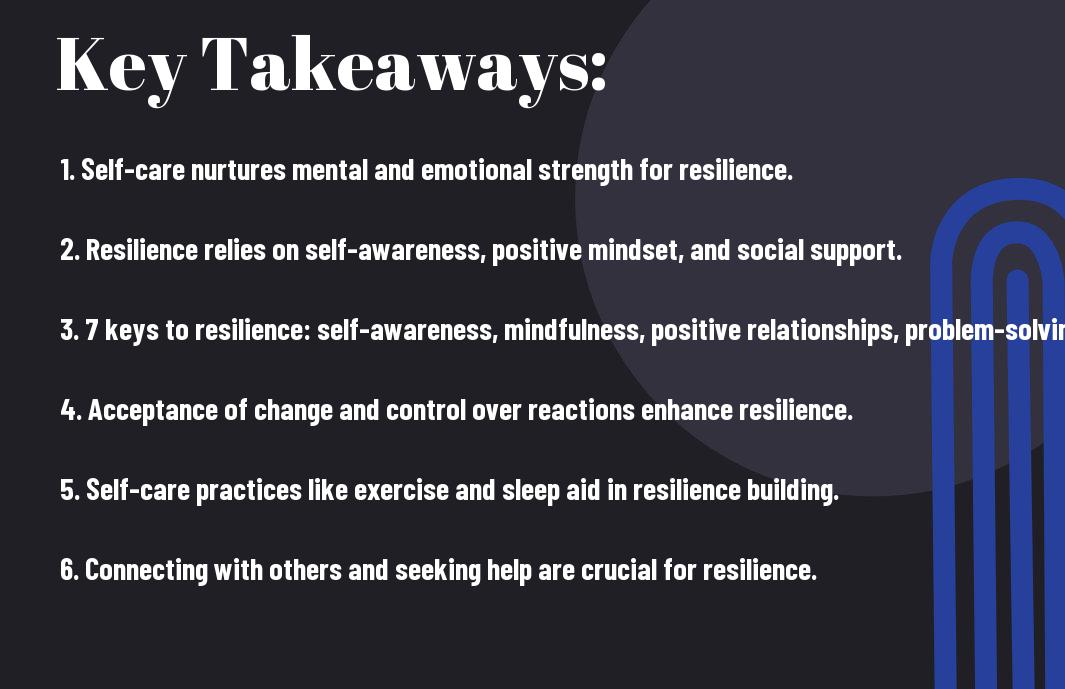What Role Does Self-care Play In Developing Resilience? What Are The 7 Keys To Resilience?
Many individuals aspire to cultivate resilience in the face of life’s challenges, and self-care is a pivotal component in this journey. Resilience is defined as the ability to bounce back from adversity, and practising self-care habits is crucial for developing and maintaining this quality. There are seven key aspects that contribute to building resilience, each playing a crucial role in fostering mental and emotional strength. By understanding the significance of self-care and incorporating these keys into our daily lives, we can empower ourselves to navigate hardships with resilience and grace.
Key Takeaways:
- Self-care is crucial for developing resilience: Practicing self-care allows individuals to recharge, reflect, and build inner strength to better handle challenges.
- Seven keys to resilience: The seven keys to resilience include self-awareness, self-regulation, mental agility, optimism, strengths of character, connection, and bringing meaning to adversity.
- Self-awareness: Being aware of your thoughts, emotions, and behaviors is crucial in understanding how to effectively navigate difficult situations.
- Connection: Building strong connections with others provides social support and a sense of belonging, which helps in overcoming setbacks and adversity.
- Meaning in adversity: Finding meaning or purpose in challenging experiences can help individuals grow and develop a sense of resilience in the face of future obstacles.


The Interplay Between Self-Care and Resilience
The Psychological Perspective
On the psychological front, self-care is a crucial component in developing resilience. By taking care of our mental and emotional well-being through activities like mindfulness, therapy, and maintaining healthy boundaries, we enhance our ability to bounce back from adversity. Self-care practices provide us with the tools to cope with stress, regulate our emotions, and cultivate a positive mindset necessary for building resilience.
Physical Health and its Impact on Resilience
One’s physical health directly influences their resilience levels. Engaging in regular exercise, eating a balanced diet, and getting enough rest are fundamental aspects of self-care that contribute to physical well-being. When our bodies are healthy, we are better equipped to handle challenges and setbacks. Physical strength and vitality are key factors in building resilience and sustaining mental fortitude.
Resilience is the ability to adapt and thrive in the face of adversity. By prioritizing self-care practices, both mentally and physically, individuals can strengthen their resilience and navigate life’s obstacles with greater ease. Self-care is not a luxury but a necessity in the journey towards building lasting resilience.
The 7 Keys to Resilience
Emotional Awareness and Regulation
On the journey towards building resilience, emotional awareness and regulation are vital. Recognizing and understanding your emotions, as well as being able to manage them effectively, can help you navigate challenges with more clarity and composure.
Maintaining Optimism and Perspective
Any resilient individual understands the power of maintaining optimism and perspective in the face of adversity. By focusing on positive outcomes and viewing setbacks as opportunities for growth, you can cultivate a mindset that fosters resilience.
Maintaining optimism and perspective involves reframing negative situations and setbacks as temporary and manageable. By acknowledging both the challenges and the potential for growth, individuals can maintain hope and motivation in the face of difficult circumstances.
Leveraging Social Support Networks
One key aspect of resilience is the ability to leverage social support networks. Surrounding yourself with a strong support system of friends, family, or mentors can provide encouragement, guidance, and a sense of belonging during tough times.
It is important to cultivate meaningful connections with others and to be willing to both give and receive support when needed. Building a supportive network can offer a sense of security and reassurance, enhancing one’s ability to bounce back from adversity.
Adapting to Change with Flexibility
One crucial skill for resilience is the ability to adapt to change with flexibility. Life is full of unexpected twists and turns, and being able to adjust plans and expectations based on new circumstances is key to overcoming challenges.
One’s ability to adapt to change with flexibility relies on staying open-minded, embracing uncertainty, and being willing to adjust strategies as needed. By being adaptable, individuals can navigate obstacles more effectively and bounce back stronger than before.
Fostering Problem-Solving Skills
An important aspect of resilience is fostering problem-solving skills. Being able to analyze situations, identify solutions, and take proactive steps towards resolving challenges can empower individuals to overcome obstacles with confidence.
With practice, individuals can enhance their problem-solving abilities by breaking down complex problems into manageable tasks, seeking feedback from others, and remaining persistent in their efforts to find solutions. By developing strong problem-solving skills, individuals can approach difficulties with a proactive and resourceful mindset.
Building Purpose and Meaning
The pursuit of resilience involves building a sense of purpose and meaning in life. Understanding your values, setting goals that align with your beliefs, and finding fulfilment in your actions can provide a strong foundation for navigating adversity.
The process of building purpose and meaning involves reflecting on personal values, exploring passions, and setting meaningful goals that give direction and motivation during challenging times. By connecting your actions to a deeper sense of purpose, you can cultivate resilience that is anchored in a strong sense of self and contribution to the world.
Taking Proactive Steps
Skills
Proactively taking steps to anticipate and prepare for challenges is a key aspect of resilience. By identifying potential obstacles, creating contingency plans, and prioritizing self-care, individuals can build a proactive approach to resilience that empowers them to navigate difficulties with confidence.
Steps
Practical Strategies for Self-Care
Daily Self-Care Practices
Many experts agree that incorporating daily self-care practices into your routine is important for building resilience. An effective way to start your day is by practising mindfulness or meditation to centre yourself and set a positive tone for the day ahead. Engaging in physical activity, staying hydrated, and getting enough rest are also crucial components of daily self-care that can help you manage stress and maintain mental clarity.
Long-Term Self-Care Commitments
Practices that focus on long-term self-care commitments are equally important for developing resilience. These include cultivating supportive relationships, setting boundaries, and establishing healthy habits that contribute to your overall well-being. By prioritizing self-care in the long term, you are investing in your ability to bounce back from challenges and thrive in the face of adversity.
With a combination of daily self-care practices and long-term commitments to your well-being, you can enhance your resilience and navigate life’s inevitable ups and downs with greater ease and confidence.
The Role of Self-Care in Professional and Personal Spheres
Self-Care for Professional Growth and Resilience
Resilience in the professional sphere is crucial for navigating challenges and setbacks. Practicing self-care in the workplace not only enhances well-being but also boosts resilience. Setting boundaries, taking breaks, and prioritizing mental health are key aspects of self-care that contribute to professional growth and resilience.
Personal Relationships and Self-Care
For maintaining resilience in personal relationships, self-care plays a vital role. Taking care of oneself allows individuals to show up as their best selves in relationships, fostering understanding, empathy, and effective communication. By prioritizing self-care in personal spheres, individuals can nurture resilience to navigate the complexities of relationships more effectively.
It is vital to remember that self-care is not selfish but necessary for building resilience in both professional and personal aspects of life. By investing in self-care practices, individuals can strengthen their ability to bounce back from adversity and thrive in the face of challenges.
To wrap up
As a reminder, self-care plays a crucial role in developing resilience by ensuring that individuals are equipped to cope with and bounce back from adversity. The 7 keys to resilience include self-awareness, self-regulation, optimism, mental agility, strength of character, connection, and reaching out. By incorporating these keys into their daily lives and prioritizing self-care practices, individuals can build their capacity to overcome challenges and thrive in the face of adversity. It is vital to remember that resilience is a skill that can be cultivated and strengthened over time through consistent self-care and intentional efforts to develop these key components.
FAQ
Q: What role does self-care play in developing resilience?
A: Self-care is crucial in developing resilience as it helps individuals recharge, manage stress, and maintain emotional well-being. By prioritizing self-care practices such as exercise, mindfulness, and adequate rest, individuals can build the mental and emotional strength needed to bounce back from challenges.
Q: What are the 7 keys to resilience?
A: The 7 keys to resilience are: 1. Positive self-view – believing in one’s abilities and strengths. 2. Self-awareness – understanding one’s emotions and reactions. 3. Problem-solving skills – having the ability to find solutions to challenges. 4. Social support – leaning on friends, family, or a support network. 5. Flexibility – adapting to change and being open to new ways of thinking. 6. Mindfulness – staying present and focused in the moment. 7. Optimism – maintaining a positive outlook even in difficult times.
Q: How does self-awareness contribute to resilience?
A: Self-awareness plays a critical role in resilience by helping individuals recognize their emotions, understand their triggers, and manage their reactions effectively. By being self-aware, individuals can develop healthier coping strategies and bounce back from setbacks with greater ease.
Q: Why is social support important for resilience?
A: Social support is important for resilience as it provides individuals with a sense of belonging, connection, and encouragement during tough times. Having a supportive network of friends, family, or colleagues can help individuals cope with stress, gain perspective on challenges, and feel more confident in their ability to overcome adversity.
Q: How can mindfulness help enhance resilience?
A: Mindfulness enables individuals to stay grounded in the present moment, manage stress effectively, and regulate their emotions. By practising mindfulness techniques such as meditation, deep breathing, or yoga, individuals can cultivate resilience by fostering mental clarity, emotional stability, and a greater sense of calmness in the face of adversity.